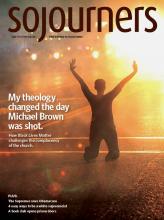FOR NON-WHITES born in post-apartheid South Africa, the country promised equal rights and legal freedom. But the first generation of “born frees,” as they are called, also entered a world where HIV/AIDS was destroying their families and communities. Many children and teens were left largely fending for themselves in townships plagued by poverty, disease, and violence.
Author Kimberly Burge, a Sojourners contributing writer, entered this world not as an aid or social worker, but rather on a Fulbright scholarship, to form a writing group for adolescent girls in the township of Gugulethu. Too old for the child-centered programs and too young for adult assistance, the girls were falling through the cracks of established programs. The writing club offered them the opportunity to creatively express their fears, frustrations, and dreams.
To Burge’s credit, the book is not primarily about her or her experiences. She keeps the focus on the girls themselves and the often breathtaking words and thoughts they express in their writing. Burge is not there to rescue them, but rather to help them find their voices. She acts less as a teacher than a peer, encouraging girls to lead the group themselves and prompting them to write about such topics as “I wish I could ...” or “I need to find a place ...”
Read the Full Article

